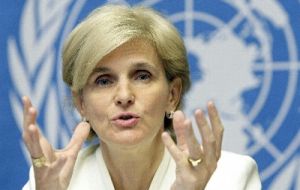MercoPress. South Atlantic News Agency
UN reveals major gaps in water and sanitation, especially in rural areas
 “Water and sanitation are essential to human health”, said Dr Maria Neira, Director of the WHO Department of Public Health and the Environment.
“Water and sanitation are essential to human health”, said Dr Maria Neira, Director of the WHO Department of Public Health and the Environment.  Two thirds of the 94 countries surveyed recognized drinking-water and sanitation as a universal human right in national legislation
Two thirds of the 94 countries surveyed recognized drinking-water and sanitation as a universal human right in national legislation Global efforts to provide improved water and sanitation for all are gaining momentum, but serious gaps in funding continue to hamper progress, according to a new report from the World Health Organization on behalf of UN-Water.
The UN-Water Global Analysis and Assessment of Sanitation and Drinking-Water (GLAAS 2014), published biannually, presents data from 94 countries and 23 external support agencies. It offers a comprehensive analysis of strengths and challenges in water, sanitation and hygiene (WASH) provision within and across countries.
“Water and sanitation are essential to human health. Political commitment to ensure universal access to these vital services is at an all-time high,” said Dr Maria Neira, Director of the WHO Department of Public Health and the Environment. “International aid for the sector is on the rise. But we continue to see major financial gaps at the country level, particularly in rural areas.”
Two thirds of the 94 countries surveyed recognized drinking-water and sanitation as a universal human right in national legislation. More than 80% reported having national policies in place for drinking-water and sanitation, and more than 75% have policies for hygiene.
This strengthened political commitment at national levels is reflected in global discussions around the post-2015 Sustainable Development Goals (SDGs). Universal and equitable access to water, sanitation and hygiene have been proposed as global targets by the Member State working group tasked with developing the SDGs.
“Now is the time to act,” says Michel Jarraud, Chair of UN-Water and Secretary-General of the World Meteorological Organization. “We may not know yet what the post-2015 sustainable development agenda will look like. But we do know that water and sanitation must be clear priorities if we are to create a future that allows everyone to live healthy, prosperous and dignified lives.”
International aid for water and sanitation is on the rise: According to the report, financial commitments for WASH increased by 30% between 2010 and 2012—from US $8.3 billion to $10.9 billion.
Aid commitments are increasingly targeted to underserved regions, notably sub-Saharan Africa, Southern Asia and South-eastern Asia. GLAAS 2014 also highlights the strengthened targeting of WASH resources for the poor: more than 75% of countries reported having specific measures in their national plans to provide water and sanitation for low-income populations.
Despite these gains, 2.5 billion men, women and children around the world lack access to basic sanitation services. About 1 billion people continue to practice open defecation. An additional 748 million people do not have ready access to an improved source of drinking-water. And hundreds of millions of people live without clean water and soap to wash their hands, facilitating the spread of diarrheal disease, the second leading cause of death among children under five.
Many other water-borne diseases, such as cholera, typhoid and hepatitis, are prone to explosive outbreaks. Poor sanitation and hygiene can also lead to debilitating diseases affecting scores of people in the developing world, like intestinal worms, blinding trachoma and schistosomiasis.




Top Comments
Disclaimer & comment rules-

Read all comments“Two thirds of the 94 countries surveyed recognized drinking-water and sanitation as a universal human right in national legislation”
Nov 21st, 2014 - 06:08 pm 0So the others don't GAF?
Commenting for this story is now closed.
If you have a Facebook account, become a fan and comment on our Facebook Page!